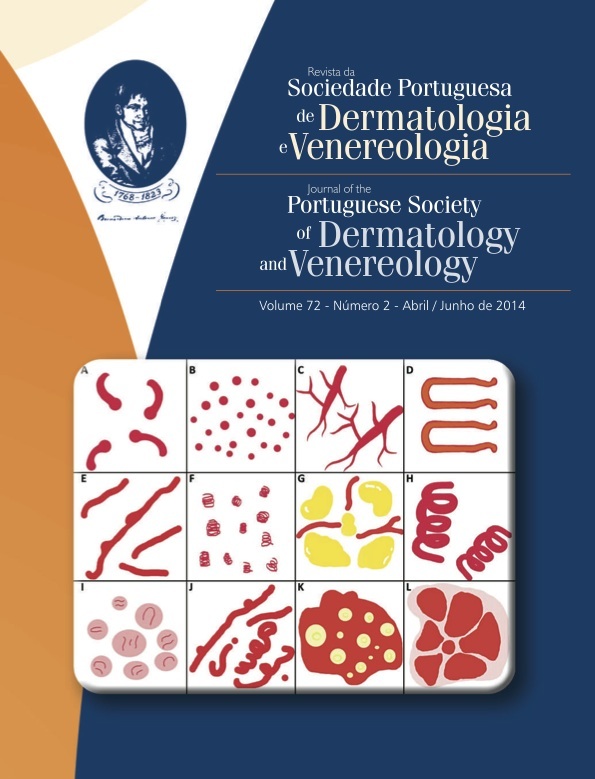SUCCESSFUL USE OF OMALIZUMAB IN A PATIENT WITH H1- ANTIHISTAMINE-REFRACTORY CHRONIC SPONTANEOUS URTICARIA
Abstract
Chronic urticaria (CU) is characterized by an evanescent, itchy wheal and flare reaction that does not resolve completely after 6 weeks. It is a relatively frequent disease that causes significant morbidity. Its therapy with drugs other than H1-antihistamines has not yet been exhaustively studied, but recently some promising treatment options have been described. We describe a case of severe, corticosteroid-dependent CU that was resistant to conventional treatment with high doses of H1-antihistamines. In this case, treatment with omalizumab, an anti-IgE monoclonal antibody, allowed control of urticaria symptoms and permitted corticosteroid interruption. No adverse reactions were reported and the drug remained effective during 18 months of therapy. We present a review of the available literature concerning the use of omalizumab in CU, emphasizing information about its long-term efficacy.
Downloads
References
Zuberbier T, Asero R, Bindslev-Jensen C, Canonica GW, Church MK, Giménez-Arnau A, et al. EAACI/GA(2)LEN/EDF/WAO guideline: definition, classification and diagnosis of urticaria. Allergy. 2009; 64(10):1417-26.
Zazzali JL, Broder MS, Chang E, Chiu MW, Hogan DJ. Cost, utilization, and patterns of medication use associated with chronic idiopathic urticaria.Ann Allergy Asthma Immunol. 2012; 108(2):98-102.
Zuberbier T, Asero R, Bindslev-Jensen C, Canonica GW, Church MK, Giménez-Arnau A, et al. EAACI/GA(2)LEN/EDF/WAO guideline: management of urticaria. Allergy. 2009; 64(10):1427-43.
Beck LA, Marcotte GV, MacGlashan D, Togias A, Saini S. Omalizumab-induced reductions in mast cell Fcepsilon RI expression and function. J Allergy Clin Immunol. 2004; 114:527-30.
Oliver JM, Tarleton CA, Gilmartin L, Archibeque T, Qualls CR, Diehl L, et al. Reduced FcepsilonRI-mediated release of asthma-promoting cytokines and chemokines from human basophils during omalizumab therapy. Int Arch Allergy Immunol. 2010; 151:275-84.
Corren J, Casale TB, Lanier B, Buhl R, Holgate S, Jimenez P. Safety and tolerability of omalizumab. Clin Exp Allergy. 2009; 39(6):788-97.
Spector SL, Tan RA. Effect of omalizumab on patients with chronic urticaria. Ann Allergy Asthma Immunol. 2007; 99(2):190-3.
Ferrer M, Gamboa P, Sanz ML, Goikoetxea MJ, Cabrera-Freitag P, Javaloyes G et al. Omalizumab is effective in nonautoimmune urticaria. J Allergy Clin Immunol. 2011; 127(5):1300-2.
Saini S, Rosen KE, Hsieh HJ, Wong DA, Conner E, Kaplan A et al. A randomized, placebo-controlled, dose-ranging study of single-dose omalizumab in patients with H1-antihistamine-refractory chronic idiopathic urticaria. J Allergy Clin Immunol. 2011; 128(3):567-73.
Maurer M, Altrichter S, Bieber T, Biedermann T, Bräutigam M, Seyfried S et al. Efficacy and safety of omalizumab in patients with chronic urticaria who exhibit IgE against thyroperoxidase. J Allergy Clin Immunol. 2011; 128(1):202-9.
Maurer M, Rosen K, Hsieh HJ, Saini S, Grattan C, Gimenez-Arnau A, et al. Omalizumab for the treatment of chronic idiopathic or spontaneous urticaria. N Engl J Med. 2013; 368:924-35.
Kaplan A, Ledford D, Ashby M, Canvin J, Zazalli J,Conner E, et al. Omalizumab in patients with symptomatic chronic idiopathic/spontaneous urticarial despite standard combination therapy. J Allergy Clin Immunol. 2013; 132:101-9.
Costa AC, Silva PM, Dias JG, Mendes A, Pedro E, Barbosa MP. Treating Chronic Urticaria With Omalizumab - Our Experience In An Immunoallergology Department. J Allergy Clin Immunol. 2012;129(2):AB225.
Costa AC, Silva PM, Dias JG, Mendes A, Pedro E, Barbosa MP. Efficacy of omalizumab in seven patients with treatment-resistant chronic spontaneous urticaria. Allergy. 2012; 67(96):452.
Luz S, Silva PM, Costa AC, Santos AS, Pedro E, Barbosa MP. O Papel do Omalizumab na Dermatite Atópica Grave. Rev Port Dermatol Venereol. 2011, 69 (2): 34-9.
Mendes AM, Costa AC, Luz S, Pedro E, Barbosa MP. Omalizumab – one year experience in the treatment of severe Atopic dermatitis. J Allergy Clin Immunol. 2012; 129(2):AB38.
Konstantinou GN, Asero R, Ferrer M, Knol EF, Maurer M, Raap U et al. EAACI taskforce position paper: evidence for autoimmune urticaria and proposal for defining diagnostic criteria. Allergy. 2013; 68(1):27-36.
All articles in this journal are Open Access under the Creative Commons Attribution-NonCommercial 4.0 International License (CC BY-NC 4.0).








